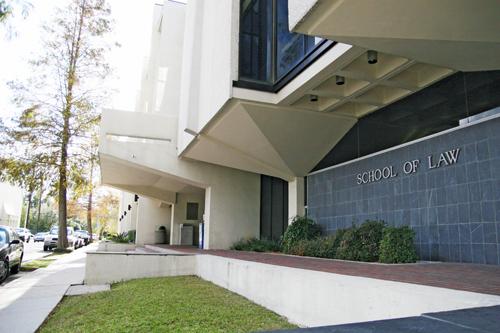Letter to the editor: Loyola Law students urge Governor Edwards to shut down harmful petrochemical plants

Photo credit: Maroon staff
April 3, 2020
**The following is a letter addressed to Louisiana Governor John Edwards and written by Loyola law students who are part of the Human Rights Advocacy Project.**
Dear Governor Edwards,
We are writing to urge you to immediately revoke the permits for Formosa Plastics in St. James Parish, and to order the safe slow down and shut down of petrochemical plants operating in Louisiana. These major sources of air pollution compound the fatalities of COVID-19.
We are students in the Human Rights Advocacy Project of Loyola New Orleans College of Law. We write to call your attention to the alarming human rights violations being suffered by residents of our state as a result of the continued operation of the petrochemical industry in the midst of the devastating coronavirus pandemic. Fundamental rights to life, health, and a safe environment are at stake.
As you know, the growth rate of coronavirus cases in New Orleans and Louisiana is the highest in the world, and the number of patients is expected to overwhelm our hospitals in less than two weeks. While the timing of carnival and the intimate and abundant social culture of New Orleans provide appealing theories for the initial dramatic increase in diagnoses, a major factor that has not been acknowledged is the markedly poor air quality in the state.
The connection between air pollution and respiratory illness is well documented. According to a study by UCLA, the Jiangsu Provincial Center for Disease Control and Prevention and Fudan University, when another coronavirus, the SARS (Severe acute respiratory syndrome) epidemic, spread across China in 2002, individuals living in areas with high air pollution were twice as likely to die . This study examined exposure to particulate matter and nitrogen oxides among other pollutants that are heavily present in our communities. We fear that Southeast Louisiana will replicate those rates.
The lower Mississippi River Delta is home to thousands of people who are already more vulnerable to COVID-19 than the average individual. From Baton Rouge to Plaquemines Parish, over two hundred petrochemical plants emit toxic and hazardous air pollutants at levels high enough to require state reporting to the EPA, including particulate matter 2.5 and nitrogen oxides. Both of these are criteria pollutants regulated by the EPA because they are particularly harmful to the respiratory system. The communities that live here, in “Cancer Alley” – which does not abruptly end at the Maurepas Swamp, but includes New Orleans and stretches into the Gulf – breathe the most dangerous air in the country. This vulnerability threatens to contribute to a daunting death rate in Southeast Louisiana that will outpace the rest of the country and devastate our communities. In addition, census tracts in Cancer Alley that have a majority of black residents and those that are largely low income face greater rates of cancer and other health risks from exposure to air pollution. These existing inequalities in toxic pollution and health outcomes will likely cause glaring disparities in the race and income level of those who die from the coronavirus.
While Louisiana’s Department of Environmental Quality unfailingly grants permits for new petrochemical facilities that will further ravage our air quality, our families and neighbors have been growing sick and dying long before the current coronavirus outbreak. Our residents suffer from cancer, skin conditions that result in immune system deficiencies, asthma and acute respiratory distress at inordinate rates because our leaders have failed to enforce Clean Air Act compliance for refineries and plastics complexes and have permitted new facilities in violation of the same statute.
For decades, the State of Louisiana has weighed the public health against the potential benefit of increased petrochemical production. So far, the whispered miasma of economic growth and the promise of jobs that never appear have proved more compelling to public officials than our lives. We already knew that our state turns a blind eye to this slow poisoning. But now, the illnesses that our citizens suffer as a result of unprotected air quality are underlying conditions that will lead to imminent death for thousands exposed to the coronavirus in Southeast Louisiana.
But you have the power to mitigate the damage of this public health catastrophe. It is time to publicly recognize that toxic air pollution from poorly regulated petrochemical facilities is contributing to the disproportionate mortality rate of Louisianans and take decisive action to protect us. Issue an Executive Order safely halting their operations, at least for the duration of this crisis. This is particularly critical in light of the EPA’s recent announcement that it will indefinitely relax monitoring and reporting requirements. Moreover, the potential for blasts or accidents that could injure workers at a time when our state’s medical resources are taxed beyond capacity is an unnecessary risk, especially as many residents in the River Parishes live an hour away from a hospital.
After the crisis has abated, we urge you to immediately review the emissions permits for these plants and to revoke permits for the Formosa Plastics plant in St. James Parish, a plastics complex that will double the current exposure to cancer-causing air toxins for St. James residents. Construction of this dangerous facility continued for days despite your executive order halting all non-essential activity in the state.
As Louisiana law students, we share the concern for our economy and the jobs of our families and neighbors, and we are committed to a thriving Gulf Coast. We believe the measures we are urging are necessary to protect our most vulnerable citizens, and for the long-term health, wellbeing, and human rights of our state as a whole.
National and international media outlets are beginning to cover the growing disaster in our state, and as the death toll rises, they will also make the connection between our toxic air pollution and our vulnerability to the coronavirus. Make this the moment that you stand with your citizens because you value our lives and our health, not because you are forced to reckon with the catastrophic consequences of a prolonged abdication of duty.
Thank you for your consideration of this urgent matter.
Sincerely,
Anna Hoiberg Brenda Solorzano Jillian Morrison Jodi Hill Kimberly Fanshier Laura Sanchez Fowler Laurel Taylor Melia Cerrato Nyanna Miller Raheem Igbadume Zora Djenohan








Bill J Lomazky • Apr 8, 2020 at 9:37 pm
Interesting letter.
Questions to the writers
– do you use any products that are produced from these types of facilities you want to abolish in your daily life like plastics, gas in your car etc.
Yes I thought so.
Bill
Mike Guidry • Apr 7, 2020 at 7:57 pm
There’s a reason they attend Loyola Law School and not Duke or Yale, they’re not the brightest. This would make tens of thousands of people unemployed. You have to think 360 degrees about every problem you ever face. Come on Loyola law.
Kelly Knowles • Apr 6, 2020 at 10:03 pm
Thank all Of You Loyola Students for writing & sending this Letter to Governor Dumb Bel Edwards. I have been involved with Air, Water, Ground and Noise Pollution since the beginning of 2018, when Dumb Bel allowed Midstream Loading Operation Companies on the Mississippi River to Operate next to our Residential neighborhoods & communities! 24/7, 7 days a week, we the Great Citizens of Jefferson Parish, especially River Ridge, Harahan, Waggaman, Kenner & Old Jefferson are now being Polluted to Death from toxic dust Cargo particles floating in the Air we are all inhaling. Prior to 2018, there were no Midstream Loading Operation Companies in our Residential Areas along the Mississippi River. The noise Pollution is incredible. I have contacted every Government Agency’s associated with this Midstream Loading Operation. We are all inhaling toxic dust particles from these Midstream Loading Operations, causing serious Respiratory Illnesses. Paired up with this Coronavirus is now a sure Death Sentence for we the Citizens. I have reached out to our State Reps & to our Corrupt LDEQ to no avail. Last year I had an Air Monitor placed in my backyard from May 1/2019 to August 14/2019 from another University. The Samples taken by the Environmental Scientist & his two Students clearly states in the Report that we are all being Bombarded on a continuous basis by Toxic Particulate Matter from the Midstream Loading Operation Companies & in addition by Highly concentrated Copper dust Particles from Cornerstone Chemical Plant and also Kemira Chemical Plant! This Air Monitoring was Professional done by a Professor of Environmental Scientist Department! Also Leaf Samples were collected, Soil Samples and Swipe Samples were Collected an sent to a Professional Lab for
Analyzing. We are all slowly dying from this Toxic Air Pollution and now exacerbated by this Coronavirus! Also Please, Please stop Cornerstone Chemical Plant from Building there New Hydrogen Cyanide Plant. Although the Great Citizens of Jefferson Parish tried to Stop this Plant from being built, our Crooked Ass Jefferson Parish Politicians have now agreed to let Cornerstone build this New Hydrogen Cyanide Plant. The Corrupt State LDEQ recently Approved the Permits to build this Plant. The only Politician, Governor Dumb Bel Edwards is the only one who can Stop this from happening, the same as Formosa.
Barbara Nye • Apr 6, 2020 at 4:59 pm
Thank you. A million times thank you! I am a hospice nurse in New Orleans seeing home care patients in Orleans, Jefferson, St Charles, and St John. I sit at their kitchen tables and listen to their stories. My heart hurts for the people who call Cancer Alley home.
Susan Finney • Apr 6, 2020 at 9:27 am
May I post this on our Harahan River Ridge Air Quality Facebook group? My daughter, a Loyola alumna shared it with me.
Sam Lucio • Apr 6, 2020 at 10:02 am
Yes! Feel free to share it!
Katie • Apr 4, 2020 at 6:40 pm
THANK YOU! The lack of accountability in Louisiana is astounding.